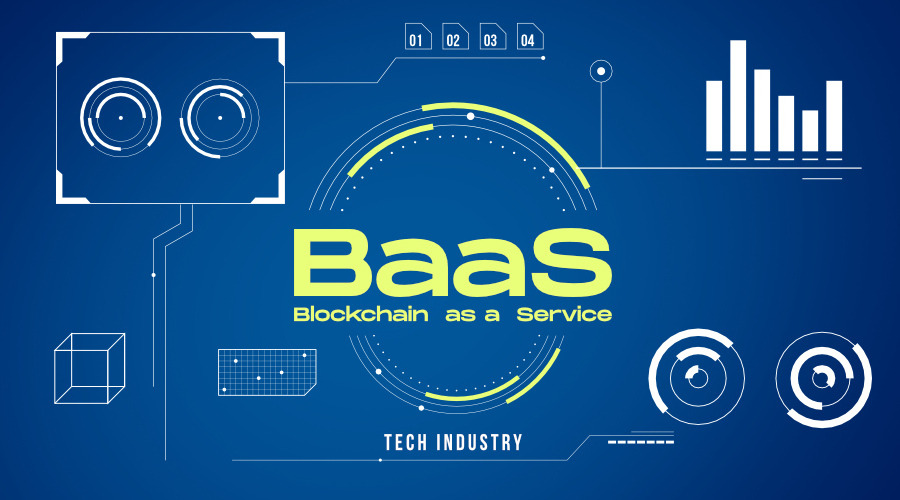Blockchain technology has been making headlines for years now, thanks to the popularity of cryptocurrencies such as Bitcoin and Ethereum. But beyond digital currencies, blockchain has the potential to revolutionize industries from finance to healthcare to logistics. However, many companies find it challenging to implement and maintain blockchain infrastructure. This is where Blockchain as a Service (BaaS) comes in. This article will explore what BaaS is, how it works, and its potential benefits and drawbacks.
What is Blockchain as a Service?
Blockchain as a Service (BaaS) is a cloud-based blockchain infrastructure that allows organizations to build and deploy their own blockchain applications without the need for the in-house blockchain expertise. BaaS providers manage and maintain the underlying blockchain infrastructure, providing organizations with easy-to-use APIs, development tools, and pre-built blockchain networks.
BaaS is a subcategory of cloud computing which has gained significant popularity in recent years due to its scalability, cost-effectiveness, and flexibility. With BaaS, organizations can leverage blockchain technology without investing in expensive hardware or recruiting specialized blockchain developers.
How Does Blockchain as a Service Work?
BaaS providers offer different levels of service, ranging from fully managed to partially managed solutions. In a fully managed BaaS solution, the provider takes care of everything from infrastructure management to network security. In contrast, partially managed BaaS solutions require the customer to handle some aspects of the infrastructure, such as network security and node management.
BaaS providers typically offer pre-built blockchain networks, such as Ethereum or Hyperledger Fabric, that customers can use to deploy their blockchain applications. These networks come with built-in consensus mechanisms, smart contract templates, and other tools that make building and deploying blockchain-based applications easy.
Customers can interact with the blockchain network through APIs provided by the BaaS provider. These APIs enable customers to create and manage blockchain nodes, deploy smart contracts, and access blockchain data.
Benefits of Blockchain as a Service
- Easy to use: BaaS providers offer easy-to-use APIs and development tools that make it easy for organizations to deploy their own blockchain applications.
- Cost-effective: BaaS eliminates the need for expensive hardware and specialized blockchain developers, making it a cost-effective solution for organizations of all sizes.
- Scalability: BaaS providers offer scalable infrastructure that can handle large amounts of data and transactions, making it suitable for enterprise-level applications.
- Reduced time to market: BaaS enables organizations to develop and deploy blockchain applications quickly, reducing the time it takes to market new products and services.
- Security: BaaS providers offer built-in security features, such as encryption and network security, that ensure the confidentiality and integrity of blockchain data.
Drawbacks of Blockchain as a Service
- Limited customization: BaaS providers offer pre-built blockchain networks, which may limit customer customisation options.
- Dependency on third-party providers: BaaS customers rely on the provider’s infrastructure and services, which may lead to vendor lock-in and dependency.
- Lack of control: BaaS customers may have limited control over the underlying blockchain infrastructure, which may not be suitable for organizations with specific security and compliance requirements.
BaaS Providers
Several major cloud providers offer BaaS solutions, including:
- Amazon Web Services (AWS)
- Microsoft Azure
- IBM Blockchain Platform
- Oracle Blockchain Cloud Service
- Alibaba Cloud Blockchain as a Service
Applications of BaaS
BaaS has a wide range of potential applications across various industries. Here are some examples:
- Finance: BaaS can be used to create blockchain-based payment systems, remittance platforms, and peer-to-peer lending networks.
- Supply Chain Management: BaaS can be used to track the movement of goods and ensure their authenticity, providing end-to-end visibility and transparency in the supply chain.
- Healthcare: BaaS can be used to create secure and interoperable electronic health records, improving patient data privacy and sharing.
- Voting Systems: BaaS can be used to create secure and transparent voting systems that prevent tampering and fraud.
- Energy: BaaS can be used to create a decentralized energy grid that enables consumers to buy and sell energy peer-to-peer, reducing the reliance on centralized power grids.
Future of BaaS
The BaaS market is expected to grow significantly in the coming years, with a projected compound annual growth rate (CAGR) of 90% from 2019 to 2025. As blockchain technology becomes more mainstream, BaaS is expected to play a critical role in facilitating its adoption.
One potential area of growth for BaaS is the development of interoperable blockchain networks that can communicate with each other seamlessly. This would enable organizations to use multiple blockchain networks for different applications, improving efficiency and reducing costs.
Another area of growth is the integration of artificial intelligence (AI) and machine learning (ML) with BaaS, enabling intelligent automation and data analytics on blockchain data.
Conclusion
Blockchain as a Service (BaaS) is a cloud-based blockchain infrastructure that enables organizations to build and deploy their own blockchain applications without the need for the in-house blockchain expertise. BaaS providers offer easy-to-use APIs, development tools, and pre-built blockchain networks, making it easy for organizations to leverage blockchain technology. While BaaS offers several benefits, such as scalability and cost-effectiveness, it also has some limitations, such as limited customization options and dependency on third-party providers. Nevertheless, BaaS is expected to play a critical role in the future of blockchain technology, facilitating its adoption across various industries.

